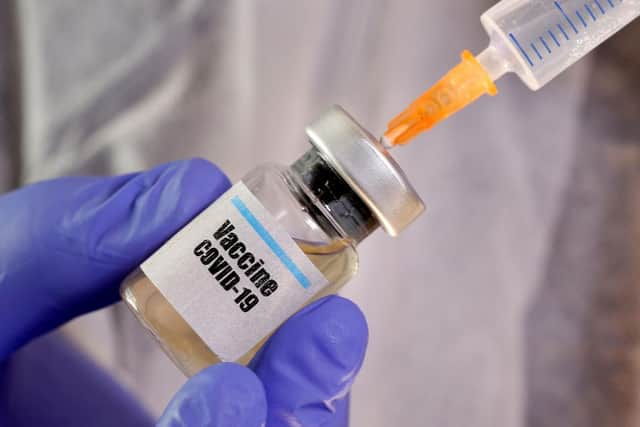NI vaccination roll-out phase two explained: When will you be able to get your vaccine?
and live on Freeview channel 276
The Department of Health has announced the beginning of ‘phase two’ of the coronavirus vaccination roll-out and pledged to complete it by the end of next month.
If all goes to plan, this will see nearly half a million people immunised against coronavirus in the space of around 35 days - a feat that will require jabs to be given out at a pace far in excess of the rates so far.
Advertisement
Hide AdAdvertisement
Hide AdPhase two will see those aged 65-79 given vaccines, as well as everyone with underlying health conditions.


The roll-out will follow what the Department of Health call a ‘twin-track’ approach - with some population groups being invited to a series of seven mass vaccination sites spread throughout Northern Ireland, and others being invited to get the jab at their local GP practice.
So far, the programme has focussed on those that live or work in care homes, frontline health workers, and the over-80s - a population of around 175,000 people.
As of January 24, 186,112 first doses had been administered as phase one nears completion.
Advertisement
Hide AdAdvertisement
Hide AdIf you are aged 80 or over and have still not had your vaccine, the official advice is that you don’t call your local practice and instead wait to be invited. The Department of Health insist that no one will be forgotten about.
The vaccination of the remaining over-80s and health workers will continue even as phase two begins.
The population to be covered in phase two has been divided into four priority groups - starting with those aged 75-79, followed by those aged 70-75 and those considered extremely clinically vulnerable, followed by those aged 65-69, and finishing with those who have underlying health conditions who are aged 16-64.
But the twin-track approach of using both GP practices for the Astra Zeneca vaccine and mass vaccination centres operated by health Trusts for the Pfizer vaccine means work is now beginning on vaccinating people from each of these population groups immediately.
Advertisement
Hide AdAdvertisement
Hide AdIf you are aged between 70-79, you can expect to be given an appointment to visit your GP for a dose of the Astra Zeneca vaccine at some stage in the next five weeks - with the 75-79 year-old age group expected to receive their appointments first.
Some over-75s have already been given appointments.
Those aged 65-69, meanwhile, will be invited in the coming days to book an appointment to visit a Trust centre to receieve the Pfizer vaccine.
Details of an online booking process and a telephone helpline are expected to be announced later this week.
The clinically vulnerable will be split between the GP vaccination programme and the Trust-run service.
Advertisement
Hide AdAdvertisement
Hide AdSome clinically vulnerable people may be invited by both their local GP and their local health Trust to receieve a vaccine. If this happens, the Royal College of GPs have advised that the best approach is to accept the invitation to go to a Trust centre to receive the Pfizer vaccine.
If you live in the Belfast Trust area, your vaccine centre will be the Royal Victoria Hospital.
For those in the Southern Trust, it will be the South Lake Leisure Centre in Craigavon, and for the Northern Trust it will be the Seven Towers Leisure Centre in Ballymena.
There are three vaccine centres in the Western Trust area - the Foyle Arena in Londonderry, Omagh Leisure Centre, and Lakeside Leisure Centre in Enniskillen.
Advertisement
Hide AdAdvertisement
Hide AdNo firm dates have been given for the next three phases of the vaccination programme.
Phase three will cover those aged between 50 and 64 — a population of around 366,000 people — and is listed for ‘Spring 2021’.
The next phase, which will be the remaining adult population of Northern Ireland — approximately 400,000 people — is listed for ‘Summer 2021’.
The final phase, which has yet to be decided but is likely to involve a routine, targeted and possibly seasonal vaccination programme resembling the existing flu vaccination programme, is listed simply for ‘2022 onwards’.